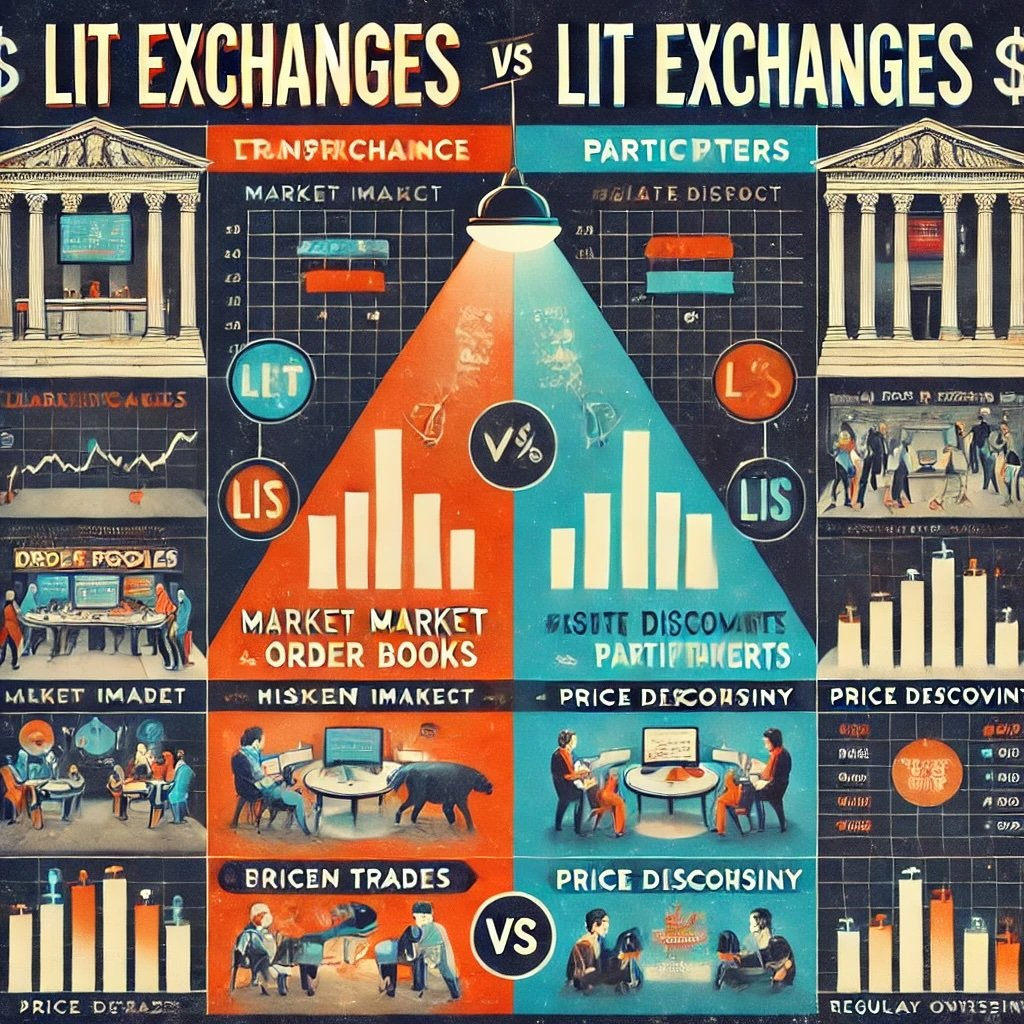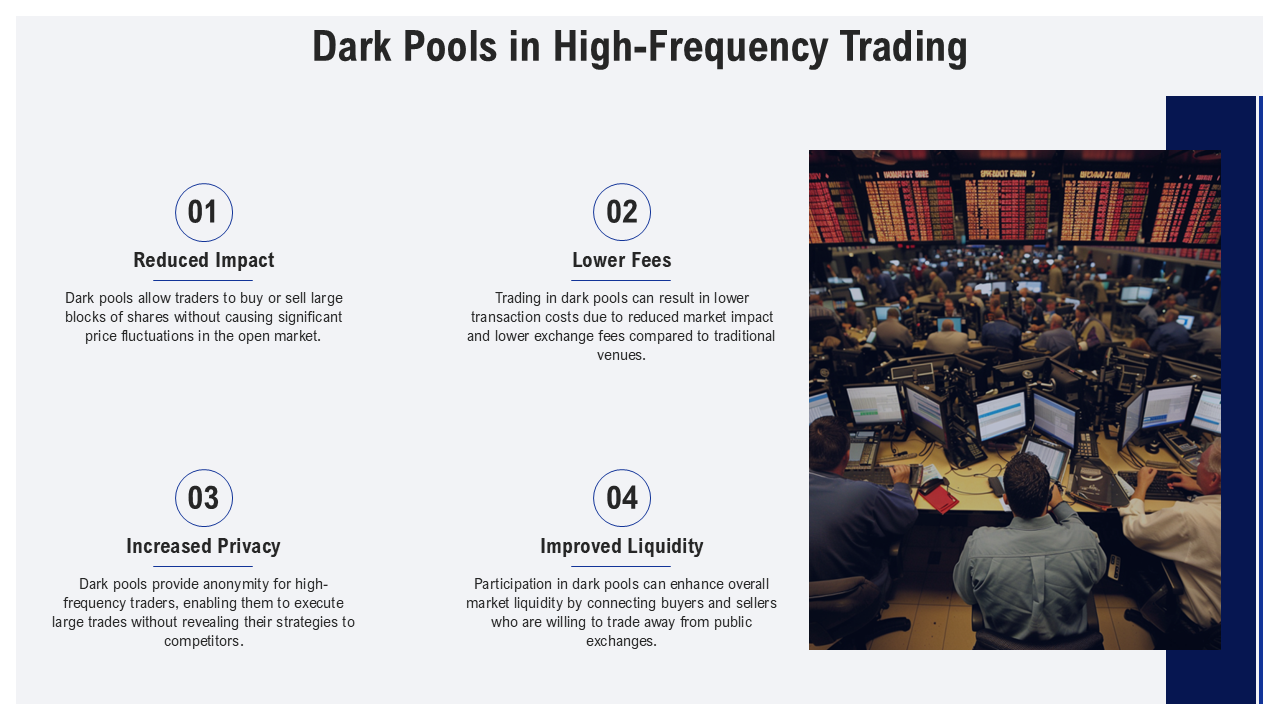Did you know that dark pools can sometimes make a game of hide-and-seek with billions of dollars in trades? In the world of finance, dark pools are private trading venues that obscure market transparency, raising questions about their impact on traders and the overall market. This article dives deep into how dark pools operate, why traders prefer them over public exchanges, and the risks involved. We’ll explore their influence on market liquidity, price discovery, and competition, as well as the regulations in place to govern them. By understanding these complex mechanisms, DayTradingBusiness aims to equip you with the knowledge needed to navigate the trading landscape effectively.
How Do Dark Pools Work in Financial Markets?
Dark pools hide large trades from public view, preventing market impact. They allow institutional investors to buy or sell big blocks of stock without revealing their intentions. This secrecy reduces price swings caused by large orders hitting the open market. Instead of displaying orders on public exchanges, traders route them through private venues, keeping transaction details confidential until after execution. This lack of transparency can lead to less market visibility and potential information asymmetry.
Why Do Traders Use Dark Pools Instead of Public Exchanges?
Traders use dark pools to hide large orders from the public market, preventing price impact. Dark pools obscure market transparency by keeping trade details private until after execution, avoiding revealing intentions to competitors. This secrecy helps institutional investors execute big trades without moving the market.
How Do Dark Pools Hide Trade Information?
Dark pools hide trade information by not displaying order details publicly before execution. They use private, encrypted systems that keep trade size, price, and participant identities hidden until after the trade settles. This prevents market participants from seeing buy or sell intentions in real-time, reducing market impact. Instead of public order books, dark pools match buy and sell orders internally, ensuring transparency only after trades are completed.
What Are the Risks of Using Dark Pools?
Dark pools hide large trades from public view, which reduces market transparency. This can lead to less accurate price discovery, making it harder for traders to gauge true market conditions. It also creates opportunities for market manipulation, such as front-running or price distortion. Additionally, the lack of transparency can cause sudden, unexplained price swings when dark pool trades are finally revealed.
How Do Dark Pools Affect Market Transparency?

Dark pools hide large trades from public view, reducing transparency in the market. They allow institutional investors to buy or sell big blocks without revealing their intentions, which can lead to less price discovery. Because these trades aren’t visible on public exchanges, they obscure the true supply and demand, making it harder for retail traders to gauge market movements. This lack of transparency can distort market signals, create unfair advantages, and increase the risk of price manipulation.
Can Dark Pools Manipulate Market Prices?
Dark pools obscure market transparency by hiding large trade orders from public view, making it harder to see supply and demand. This lack of visibility can allow traders to execute big transactions without impacting the market price immediately. While dark pools aim to reduce market impact, they can be exploited for price manipulation or to gain an unfair advantage. Overall, their secrecy can distort true market conditions, making prices less transparent and more susceptible to manipulation.
How Do Dark Pools Impact Price Discovery?
Dark pools hide large trades from public view, making it harder for investors to see true supply and demand. This opacity can lead to less accurate price discovery because the market isn’t fully informed about big transactions. As a result, prices may not reflect the actual market consensus, increasing the risk of mispricing and reducing overall market transparency.
What Regulations Govern Dark Pools?
Dark pools are governed by regulations like the SEC Rule 611 of Regulation NMS, which aims to prevent market abuse and ensure fair trading. They must also comply with FINRA rules that oversee broker-dealers operating dark pools. These regulations require disclosures on execution quality and limit order sizes but don't mandate public pre-trade transparency. The goal is to balance market efficiency with investor protection while allowing dark pools to obscure order details from the public.
How Do Dark Pools Influence Market Liquidity?
Dark pools reduce market transparency by hiding large trades from public view, which can obscure true supply and demand. This lack of visibility can lead to less informed trading decisions, potentially increasing volatility. While dark pools provide liquidity for big traders, they make it harder for regular investors to see the full market picture, impacting overall transparency.
Are Dark Pools Safe for Retail Investors?
Dark pools obscure market transparency by hiding large trades from public view, preventing retail investors from seeing market impact. This lack of visibility can lead to less informed trading decisions and increased risk of price manipulation. While dark pools aim to reduce market impact for institutional traders, retail investors face challenges in assessing true market prices and liquidity.
How Do Dark Pools Affect Market Competition?

Dark pools hide trade details from public view, limiting transparency. This makes it harder for other traders to gauge true market prices and liquidity. As a result, they can create an uneven playing field, giving institutional investors an advantage. Reduced transparency can lead to less competition, since smaller traders can't see or respond to large block trades. Overall, dark pools can distort market signals, impacting fair price discovery and reducing market efficiency.
Learn about How Do Dark Pools Impact Market Fairness?
What Are the Benefits of Dark Pools for Large Traders?
Dark pools let large traders buy and sell big blocks of shares without revealing their intentions, avoiding market impact. This secrecy prevents price swings that could work against them, ensuring better execution prices. They help large traders execute trades discreetly, reducing the risk of front-running by other market participants. Dark pools also provide more privacy, allowing traders to avoid signaling their strategies. Overall, they offer better control over trade timing and minimized market disruption.
How Do Dark Pools Obscure Trade Volumes?
Dark pools hide trade volumes by executing large orders privately, outside public exchanges. They don’t display real-time data, so the number of shares traded or price movements remain hidden until after the trade settles. This lack of transparency prevents other market participants from seeing the true size of transactions, making it harder to gauge supply and demand. As a result, dark pools obscure overall market transparency by limiting visibility into big trades that could influence stock prices.
What Is the Role of Dark Pools in High-Frequency Trading?

Dark pools hide large trades from public view, making it hard for other traders to see supply and demand. In high-frequency trading, dark pools allow algorithms to execute big orders without causing market swings or revealing strategies. This secrecy gives HFT firms an advantage by avoiding price impact and front-running risks. As a result, dark pools reduce market transparency, making it tougher for retail investors and smaller traders to gauge true market conditions.
Learn about What Are Dark Pools and Their Role in Institutional Trading?
How Do Dark Pools Impact Market Fairness?
Dark pools hide large trades from public view, reducing transparency and making it harder for investors to see true supply and demand. This secrecy can lead to less fair pricing, as big players can execute trades without influencing market prices or revealing their intentions. It creates an uneven playing field, where retail investors and smaller institutions might get less accurate information, potentially leading to less efficient markets.
Learn about How Do Dark Pools Impact Market Fairness?
Conclusion about How Do Dark Pools Obscure Market Transparency?
In conclusion, dark pools play a significant role in shaping market dynamics by providing anonymity for large trades, which can obscure market transparency and impact price discovery. While they offer benefits like reduced market impact for institutional investors, the associated risks and potential for manipulation raise concerns about fairness and competition in the marketplace. Understanding these complexities is vital for all traders. For more insights on navigating these challenges, DayTradingBusiness is here to help you make informed trading decisions.
Learn about How Do Dark Pools Impact Market Fairness?
Sources:
- Volatility and dark trading: Evidence from the Covid-19 pandemic ...
- Vague labelling laws and outdated fish naming lists undermine ...
- Spoilt for choice: Determinants of market shares in fragmented ...
- The market quality effects of sub-second frequent batch auctions ...
- The spatial uneven difussion of energy-efficiency transparency ...
- Reconceptualizing the Regulation of Global Finance